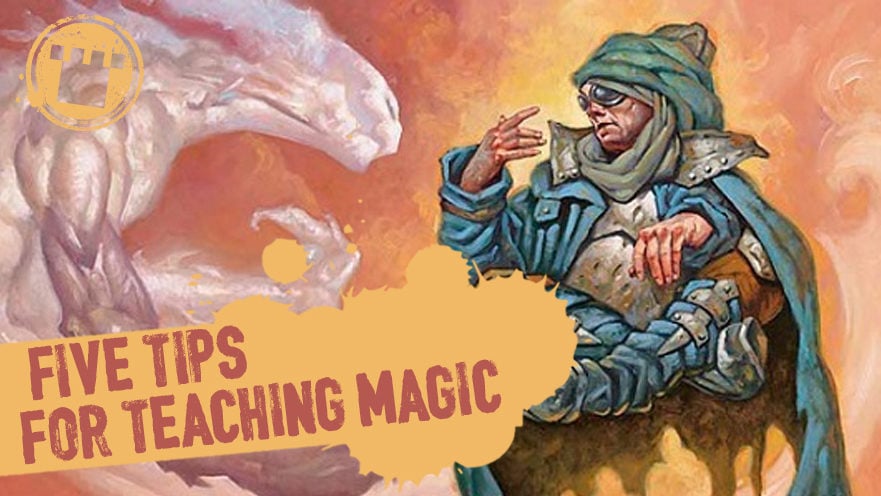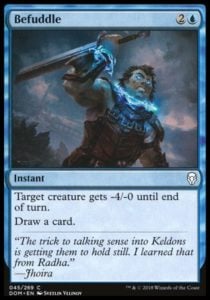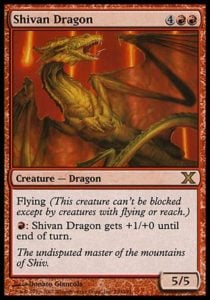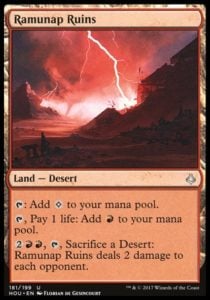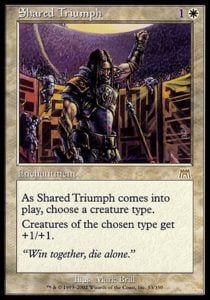Think back to a time when you didn’t know how to play Magic. Back when you were ignorant to the subtleties of mana curves and card advantage, combat tricks and counterspells. For some of you, that time may have only been a few months ago. Maybe a couple years. Maybe you’re even like me, and you’ve been playing Magic for more than half your life.
I first learned in 2001, when Odyssey was the newest set on shelves and we put cards in our graveyards for fun. (Look up the threshold mechanic…it was an odd time). It’s easy to take all the knowledge you’ve acquired during that time for granted. However, should you ever find yourself teaching a new player how to play Magic, you must remember what it was like to know nothing.
The advantages of teaching new people how to play should be self-evident. Magic is a great game, and sharing it with our friends and communities increases the number of people who get to enjoy it. Magic teaches cognitive skills, brings people together through victories or defeats, and, most importantly, lets us all know the power of summoning dragons to fight on our behalf. Once you feel comfortable enough with your own mastery of Magic, you should take a crack at teaching someone new.
Over the past year, I’ve been fortunate enough to lead a once-a-month Learn-to-Play Magic session here in Seattle, at Card Kingdom‘s brick-and-mortar storefront, Mox Boarding House. During that time, I’ve cultivated a few tips to keep in mind when teaching Magic.
1) Give them permission to be confused.
For many people, not knowing the answer to a question is terrifying. Our culture rewards assuredness and confidence, leaving many people concerned about the prospect of not knowing how to quickly pick up a new skill. I see this run rampant in gaming – when people ask me for new game recommendations, “easy to learn” is by far the most common criterion.
No matter how you slice it, Magic is not a simple game. To help people get into the groove, make sure that your student knows that it’s okay to get things wrong. Share stories of your own silly mistakes. Laugh through the inevitable rookie blunders. Especially when they’re learning from an experienced player, many of those new to Magic will feel like they are under a microscope. A good teacher will know how to dissipate that tension and fear, and help the new player focus on fun and growth.
2) Find out what they enjoy about the game.
Okay, so you’ve covered the basics. Your pupil understands how to tap lands for mana and can figure out combat damage nine out of ten times. What’s the next step? Ask them what has felt the most fun during your games so far. Every Magic player has their own sense of what’s natural and joyous during a game. Some love to hoard cards in their hand, drawing off their library whenever possible, and relishing the options that provides. Some will want to cast the biggest creatures possible. Whatever that looks like, encourage them to lean into that element of the game.
One of the biggest mistakes I see experienced players make when teaching is to tell their students that a certain card or strategy “isn’t good.” Especially if you come from the tournament scene, it’s easy to forget a time when Magic wasn’t all metagames and sideboard tech. Think back to those early days, when owning literally any Magic cards was exciting. If your learner wants to stick with Magic, they’ll find out what strategies are optimal soon enough. For now, just cheer with them when they finally get to resolve that Shivan Dragon.
3) Tailor your teaching to their goals.
Not everyone wants to learn Magic for the same reason. Many just want to play with their friends or be part of the community they’ve seen around them. Others may want to jump directly into competitive play. These different goals require totally different teaching styles. Take the time to ask your student where they want to be in their Magic playing a month from now, or six months from now, and nudge their learning toward that end point.
Even if they want to dive into competitive play, don’t just grab a top decklist from the internet and put the cards in their hands. Take the time to help them understand how all the pieces fit together. If they want to play certain cards that you know to be sub-optimal, help them discover why those cards aren’t the best on their own terms. Your headstrong pupil wants to play Ramunap Ruins in their Modern Burn deck? Play a dozen games against them, then ask how the Ruins performed. Letting your student reach those conclusions on their own will set them up to be stronger deckbuilders and players in the future.
4) Show up for them when they take big steps.
At some point, your eager learner will want to push themselves. This might mean joining a Commander game with your friends, or going to FNM at your local store. They might even go full immersion and register for a Grand Prix. These kinds of events can be tremendously exciting, but the chance of disappointment is also high. When they announce that they want to take that big step, for the love of Serra, go with them!
Nothing is more demoralizing than doing poorly in a Magic event and not having a friendly face around. For newer players, it’s all the more terrifying. Without the experienced confidence under their belt to weather those first big disappointments, it can be a time when players may consider giving up Magic for good. Be there to help provide perspective, inspirational pep talks, or even just a good, strong hug. Whatever you wish you had when you first felt heartbroken by a game of Magic, provide that for your student, and then some.
5) Remember that they don’t have to like Magic.
Magic is not for everyone. You and I may love it, but there are plenty of other people for whom Magic just won’t resonate in the same way. For those of us with identities deeply tied to the game, having our friends, partners, or families turn away from Magic can be frustrating. However, it’s essential that you support them if they choose not to follow in your footsteps.
For some, the sheer number of cards and strategies will prove too daunting. Others may prefer games where they can build more of a relationship with the characters they are interacting with during the game. I spoke with a co-worker recently who said he tried Magic, but prefers tabletop miniatures games because he can create a whole sense of character around the models he has poured hours of time and energy into. Some may simply just not be into the swords and sorcery of it all. Remember that your connection to those people is not reliant on Magic. Puts the cards away, go to your favorite hangout spot, and focus on all the other shared interests you have.
So, I’ve taught you all how to teach! Go out into your communities this month and find someone who seems like they need some Magic in their lives.

Simon is a Retail Sales Specialist at Mox Boarding House Seattle. He started playing Magic during Odyssey block, finding success on the Junior Super Series circuit and eventually playing at the 2004 US Nationals. After a multi-year break from the game, he was brought back with the reprinting of his favorite card, Lightning Bolt, in the 2010 Core Set. Simon is a loyal Red Deck Wins player and is always doing his best to win with Mountains in every Constructed format. He has a deep affection for the Magic storyline and will happily discuss the peculiarities of the Kamigawa block with you upon request.

